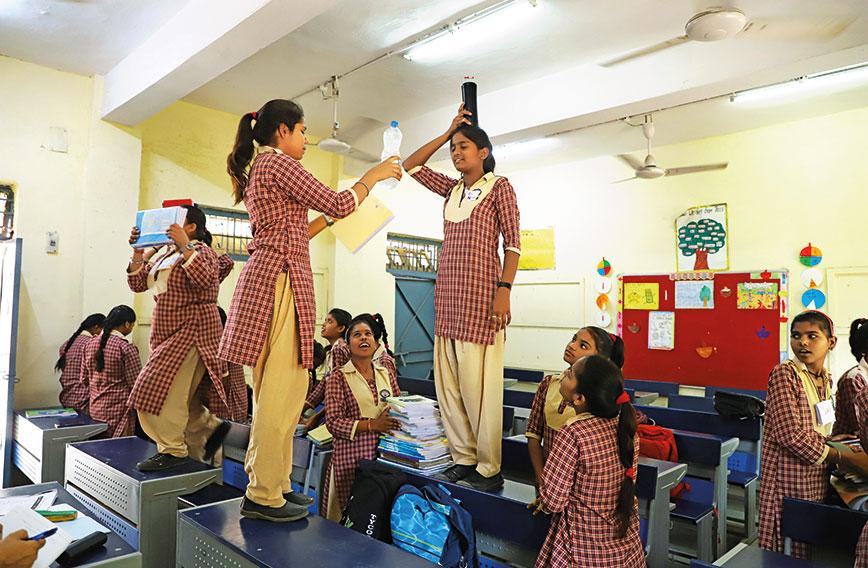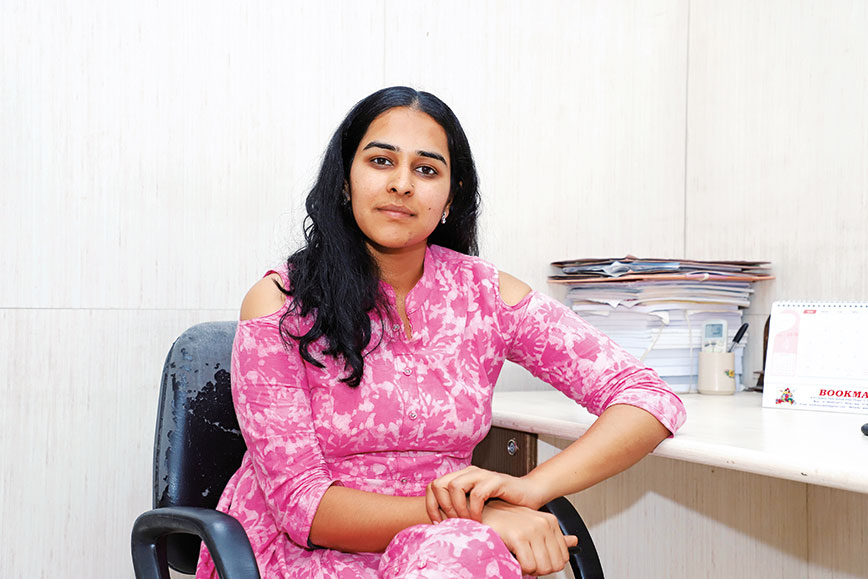
Girls in a class on entrepreneurship
Enterprise syllabus livens up classrooms in Delhi
Kavita Charanji, New Delhi
During a 40-minute class, girls in Class 10 at the Sarvodaya Kanya Vidyalaya, a government school, listen intently to terminologies taught in management courses. They soak in terms like optimisation of resources, team spirit, critical thinking, empathy and a whole lot more.
The class is interactive and lively and spiked with stories, exercises and discussions. The girls stand on their benches to build ‘towers’ with school bags, books, pens, geometry boxes and water bottles. They talk about fear, learn about mindfulness and the value of collaboration. No dreary textbooks, no soporific topics.
This is the new Entrepreneurship Mindset Curriculum (EMC), introduced as a pilot from April 1 to May 10 by the Delhi government’s Directorate of Education in 24 government schools.
From July, the EMC will be formally introduced. It will be taught in 1,022 government schools to 700,000 students in Classes 10-12. The new curriculum has no parallels across the world either in content or scale.
The idea of such a curriculum was conceived by Manish Sisodia, Delhi’s deputy chief minister. He has repeatedly emphasised that schoolchildren, who are always under pressure to strive for better marks, should be encouraged to explore their inner potential. They must imbibe entrepreneurial qualities like leadership and communication skills and aspire to become job givers rather than mere job seekers.
Girls in Class 10 C in the Sarvodaya Kanya Vidyalaya talk about fear. “We should face our fears headlong and not run from them,” says Arti Singh.
Riya Kumari enjoys the mindfulness exercises. Her ambition is to join the Indian Police Service where she wants to share with others the importance of teamwork and mindfulness. “In the mindfulness exercise I taught the children that thoughts may come and go like clouds when they close their eyes. But they should focus on the present moment. The idea is to help children relax and feel less stressed,” says Anju Chhabra, a teacher of English who is filling in for another teacher.
Says Sushila Singh, a Class 12 student, “Earlier we used to settle down to studies straightaway. Now we have 40 minutes to enjoy ourselves by learning about teamwork, mindfulness and a whole lot of other things.”
The children have different ambitions. One still aspires for a government job. Another wants to become a yoga teacher. A third is keen to become a fashion designer.
The EMC syllabus was developed by the faculty of the State Council of Educational Research and Training (SCERT), Delhi, in partnership with schoolteachers, NGOs, institutions and individual volunteers.
Dr Sapna Yadav, a senior lecturer at SCERT who anchors the 15-member core team, explained the thinking behind the curriculum. “The aim is to build 11 entrepreneurial mindsets like mindfulness, confidence, collaboration, critical thinking, bouncing back from failure, identifying opportunities, and analysis. All children need these mindsets so that their professional journey is smoother once they finish school. This applies across the board whether children opt for jobs, start-ups or expand family businesses,” she says.
Yadav is enthusiastic about EMC. The curriculum, she feels, will help young minds become sharp and innovative. In one class, she says, a child explained positivity by drawing parallels with a sieve. It throws out negative qualities and retains positive qualities. Another child likened himself to a bowl that allowed him to control his anger and not let it spill over.
Mekin Maheshwari, founder of Udhyam Learning Foundation, a non-profit in Bengaluru, is part of the core team that framed the curriculum along with Archita Sisodia, a team member from Udhyam. She has camped in Delhi over the past few months.
“We all know that unemployment is rampant and jobs that educational institutions are preparing students for might not even exist five years down the line. So from an early age, schoolchildren have to develop an independent personality. They should be able to spot an opportunity and practise what the EMC is teaching them in school,” says Sisodia.
 Teachers were trained on how to teach the syllabus | Photograph by Shrey Gupta
Teachers were trained on how to teach the syllabus | Photograph by Shrey Gupta
Stories, experiential activities and mindfulness exercises are fundamental to the curriculum. The children read inspirational real-life stories — Dr Verghese Kurien, architect of the ‘White Revolution’ and the brain behind Amul; E. Sreedharan, who built the Metro in Delhi; Krishna Yadav, a street vendor-turned-entrepreneur who has set up a successful pickle business with around 2,000 employees; Binny Bansal and Sachin Bansal, Flipkart's founders; and visually impaired Srikant Bolla who after repeated rejections by educational institutions in India joined the Massachusetts Institute of Technology (MIT) and went on to found a start-up called Bollant Industries that has an eco-friendly product line and employs over 150 disabled individuals.
Practical experience forms an important part of the curriculum. The Delhi government has announced that seed money of Rs 1,000 will be given to students of Classes 11-12 to run real businesses once the curriculum takes off. The idea is to encourage students to apply what they learn in their EMC classes. The Delhi government will budget around Rs 40-50 crore for this scheme from the next financial year.
A major attraction for students is that they don’t have to ‘pass’ the EMC class. There are no exams or tests. Instead, teachers and mentor teachers monitor the entrepreneurial mindset of the students. Each of the EMC teachers, who are drawn from various disciplines, goes through a day’s training by the SCERT faculty.
At Sarvodaya Kanya Vidyalaya nine teachers have been trained so far. EMC has great spin-offs for teachers too, says Dr Renu Bhatia, principal of the school. She concedes that they do have a huge syllabus to navigate but she has observed that the EMC has helped teachers become more creative and less stressed.
“The children enjoy the new curriculum greatly. Their cheer rubs off on their teachers. The environment for academics has received a boost in our school,” says Pratibha Rani, a teacher of political science in Class 10 C and coordinator of the EMC in Sarvodaya Kanya Vidyalaya.
But there are challenges. Teachers could be sent off for CBSE evaluation or election duties. Absenteeism is also a problem. “We have motivated teachers who believe completely in EMC and do a great job. But there is a fair degree of resistance as well because teachers are overloaded,” admits Sisodia. “Since we started the curriculum, we have observed that an arts teacher is able to implement the curriculum better than a science or maths teacher. This is because science and maths teachers are under a lot of pressure. These are difficult subjects for most students and they have to complete the syllabus on time.”
The EMC team also found that older teachers resisted teaching the EMC. Younger teachers tended to be more open-minded. “We try to understand the teacher’s mindset and learn from our feedback,” says Sisodia.
 Archita Sisodia, a team member from Udhyam | Photograph by Shrey Gutpa
Archita Sisodia, a team member from Udhyam | Photograph by Shrey Gutpa
Whether schools will take to teaching the EMC with panache will depend on the commitment of the Directorate of Education, facilitators, the content team and schoolteachers. Among the contributors to the project are Tarak Goradia, coach of the Youth Leadership Programme, non-profits such as Udhyam Learning Foundation, Alohomora Education Foundation, Dhritti, Pravah, Pratham Foundation and Kshamtalaya Foundation.
Each organisation contributes to the programme. Udhyam, for example, “focuses on grassroots entrepreneurship and entrepreneurial skill with a hope to maximise human potential,” says Maheshwari in a blog on Udhyam’s website.
“Our top eight sectors created 1.35 lakh jobs in 2015, while about 1.25 crore Indians turned 18,” said Maheshwari, who earlier worked with Flipkart as its Chief People Officer. With GDP growth becoming more capital-led rather than labour-led, the future looks bleak for current jobs. But the emergence of e-commerce and taxi services means that there is a lot of space for creating a chain of small entrepreneurs who provide basic services.
Creating entrepreneurial mindsets means inculcating qualities like creating things with your hands, experimenting, networking and collaborating. These are ignored by the rigidity of our education system.
Udhyam, which was founded in January 2017, runs the Udhyam Shiksha Programme in schools, colleges and with other non-profits in urban and rural Bengaluru and elsewhere in Karnataka and Haryana. The aim is to help youth develop an entrepreneurial mindset through experiential learning and hands-on experience to start and run real businesses for which they are provided Rs 10,000 as project money. The Udhyam Vyapaar Programme mentors small businesses so that they can scale up and be successful.
Udhyam’s philosophy was in alignment with Manish Sisodia’s vision. When the Delhi government put out a call for applications for the development of the curriculum, Maheshwari and many other NGOs and individuals applied. Finally, Udhyam was selected along with several others. The EMC is ready to take off in Delhi government schools and the team of experts that will guide its fortunes couldn’t get any better.
Comments
Currently there are no Comments. Be first to write a comment!



